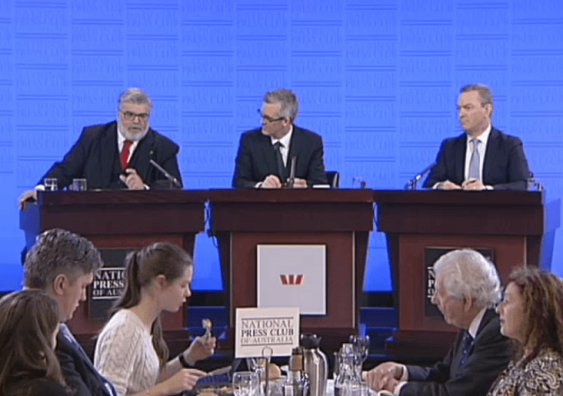Pyne versus Carr on innovation – who came out top?
Building a proper foundation for innovation and industry will deliver for us and for our children as we sail into the Asian Century, writes Merlin Crossley.
Building a proper foundation for innovation and industry will deliver for us and for our children as we sail into the Asian Century, writes Merlin Crossley.

OPINION: Not everyone would watch Liberal minister for innovation, science and industry, Christopher Pyne, debating Labor’s innovation, science, industry, research and higher education minister Kim Carr at the National Press Club in preference to going to see Batman versus Superman – but I did.
I recognise that neither is really a superhero, but over the years I’ve warmed to Carr’s passion for science and innovation and I enjoy Pyne’s quick wit and cheerful stubbornness.
From the outset it was clear that this wasn’t going to be a conventional head-to-head battle.
The ministers' titles overlap in the words “innovation” and “industry”, and those two words framed the debate.
Carr quickly pointed out that the word innovation had made a comeback. It had been banned under Abbott’s government but in Turnbull’s it was enthusiastically embraced.
There is some truth in this; the word is now spread around so much that it is rapidly losing meaning.
Pyne used the word as a synonym for “improvement” and his policies seem directed at driving innovative industry from the grass roots.
Importantly, though, a question from the floor suggested that in Australia most wealth has been created not by innovation and start ups, but by property, mining or retail.
Indeed, it is fairly clear we have a long way to go before a truly innovative culture is established. But Pyne correctly pointed out that there have been wins: he cited Atlassian and Wifi, but could have also wheeled out Cochlear, ResMed and the Victor Lawn Mower.
Pyne’s main message was that last year’s National Innovation and Science Agenda (NISA), a A$1.1 billion investment including 24 key initiatives, remained central to the Turnbull government’s platform.
It provides specific funding for strengths such as Quantum computing, as well as more general schemes intended to link researchers with industry. This was a significant departure from the former Abbott government’s approach, in which science had been neglected or cut.
Carr’s main message was that Labor would restore funding to the CSIRO and university research in order to drive high-tech manufacturing. As minister he would establish a department of innovation.
Carr has announced his own billion dollar plus package that includes funding the Cooperative Research Centres, regional institutions, the Great Barrier Reef, and industry linkages.
One key difference was that Carr actively talked about universities, which are in his portfolio. This contrasts with the Coalition, which seems to place them with Simon Birmingham.
Nevertheless the knowledge creation and wealth generation by universities is clearly relevant to industry and innovation, so the split of portfolios may have merit.
A turning point was when Julie Hare from The Australian pointed out that it was the failure to fund university research that was the problem in the higher education sector, not the funding of teaching. She was implying, quite rightly, that getting this foundation right could be a first step in growing an innovative culture.
In other words, if the full costs of research were funded, as suggested by the Cutler Review back in 2008, and planned by the Rudd government but later curtailed by the Gillard government, then we would get back on track with driving innovation.
Carr pledged to reignite the scheme he initiated all those years ago - the Sustainable Research Excellence program. This scheme was designed to cover the indirect costs of research to ensure that top performers were not dragged down by the weight of their successes.
You’ll note that the debate over science in Australia has become quite confusing as policy setbacks have occurred. This is not so much when one party replaces another, but when the government stays but the prime minister changes. In some ways, science policy appears to be coming down to the personality of our leaders.
Nevertheless, the planets have aligned and we are now in quite a remarkable situation – all three parties, the Coalition, Labor and the Greens vocally support science and innovation as critical to their agendas.
The major parties differ in style – Pyne talked more about changing taxes and incentives to stimulate growth and industry; Carr had clear plans for stimulus and government investment. Both were supportive.
But there was one thing that impressed me more than all that. It occurred to me when Donald Trump’s name was mentioned in passing. We don’t seem to have any real extremes in this campaign: sure, we are struggling to find clear strategic leadership and sustained investment but the debate was civil and constructive.
There were some big names in universities, technology and business mentioned today – Ian Chubb, Alan Finkel, and Catherine Livingston to name a few. If we can tighten our resolve to stop talking and actually commit to real and unwavering investments in real priorities, then perhaps Sustainable Research Excellence will not elude us.
The Coalition is resting on its laurels and relying on the National Innovation and Science Agenda and the Medical Research Fund to establish its credentials. Labor is hoping to renew the promise of the early Carr/Rudd vision.
Nothing in the debate really shifted the momentum for me, but I hope we can step up a gear and mature into a nation that sticks to its plans in creating a culture of knowledge and wealth generation.
If we get it right then at last we will be able to build a proper foundation for innovation and industry that will deliver for us and for our children as we sail into the Asian Century.
Merlin Crossley, Deputy Vice-Chancellor Education and Professor of Molecular Biology, UNSW.
This opinion piece was first published in The Conversation.